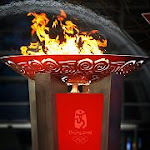

What happens next is that Ma will offer assistance to the helpless pitiless giant.
Ma calls on China to give Taiwan space
By Kathrin Hille in Taipei
Published: May 20 2008 06:55 | Last updated: May 20 2008 06:55
Taiwan’s new president has called on China to stop its suppression of the island on the international stage, highlighting the amount of goodwill he expects from Beijing in pursuing warmer ties.
Ma Ying-jeou, who won the island’s presidential election in March on pledges of rapprochement with Taiwan’s politically hostile neighbour, said in his inaugural address on Tuesday: “Taiwan doesn’t just want security and prosperity. It wants dignity.”
EDITOR’S CHOICE
Quake charity bypasses politics - May-19
Economy to guide Taiwan hardliner - May-02
Hardliner won’t strain China-Taiwan ties - Apr-30
Taiwan names hardliner as China policy head - Apr-28
China and Taiwan to open dialogue - Apr-12
Video: Ma Ying-jeou on cross-strait outlook - Apr-08
Since Mr Ma’s landslide victory, a string of meetings between politicians of the Kuomintang, Mr Ma’s party, and Hu Jintao, China’s president, have raised high hopes that the two governments can resume a dialogue suspended since 1998 and start closer economic cooperation.
Although the People’s Republic of China has never ruled Taiwan, it claims sovereignty over it and threatens war should the island formalise its de facto independence.
Chen Shui-bian, Mr Ma’s predecessor, focused on strengthening a separate national identity for Taiwan and challenging Beijing’s policy of isolating the island internationally. That led to a climate of mutual distrust, and initiatives for closer economic links ran aground.
Mr Ma expressed confidence that with pragmatism on both sides, a new era of cooperation could start. Recent remarks by Mr Hu showed “views [that] are very much in line with our own,” he said. But he stressed that Taiwan expects China to use this common ground to cooperate with, rather than fight the island, internationally.
“In the light of our common Chinese heritage, people on both sides should do their utmost to jointly contribute to the international community without engaging in vicious competition and a waste of resources,” Mr Ma said.
For decades, Taiwan and China have competed for diplomatic allies to back up their respective claims of sovereignty over the island. In his inaugural address, Mr Ma said residents of Taiwan and China both belonged to the Chinese people, a definition that is controversial with parts of the Taiwanese public but set to please Beijing.
Analysts said that whether Mr Ma can get China to agree to his proposal of a diplomatic truce and his demand that Beijing grant the island some basic participation in the international community is set to become a key test for whether his approach to rapprochement can succeed.
Mr Ma also spent a great deal of time praising Taiwan’s democracy and the island’s history as an immigrant society in what observers said was likely to become a cornerstone of a more inclusive, less controversial patriotism the incoming government wants to foster.
Mr Chen has often used Taiwanese nationalism to rally support but thus offended both China and more recent immigrants from China who still embrace a Chinese patriotism.
Mr Ma, himself a post-war immigrant to Taiwan, said he would be forever grateful to society for accepting and nurturing him. He also said the Republic of China, the state founded in China in 1911 whose institutions and constitution Taiwan continues to use, had been “reborn on Taiwan”.
Copyright The Financial Times Limited 2008


No comments:
Post a Comment